The Challenge
Mozambique has a complex history of land tenure. Under Portuguese colonial rule, large tracts of land were given to private companies for development. Much of the rest of the country’s land continued to be governed under customary systems of governance. After Mozambique gained independence in 1975, the land tenure system changed to one that is fairly common in sub-Saharan Africa and parts of Asia: all land in Mozambique is officially owned by the state, although individuals, communities, and private sector companies are allowed use and access rights to land. Companies that were given land during the colonial period retain rights to that land.
In the mid-1990s, a new Land Policy and Land Law sought to both strengthen the rights of millions of Mozambicans who had been occupying and using land and to lay the foundation for further private investment and development.1 Communities and individuals can now assert their established land rights under the new law and request registration of those rights, whilst land for investment was made available through long-term leaseholds. However, over 75 percent of rural land remains unregistered and under informal tenure arrangements, leaving millions of rural residents without documented tenure rights. This tenure insecurity can limit people’s incentive to invest in their land for fear that others could come in and try to claim their plot.
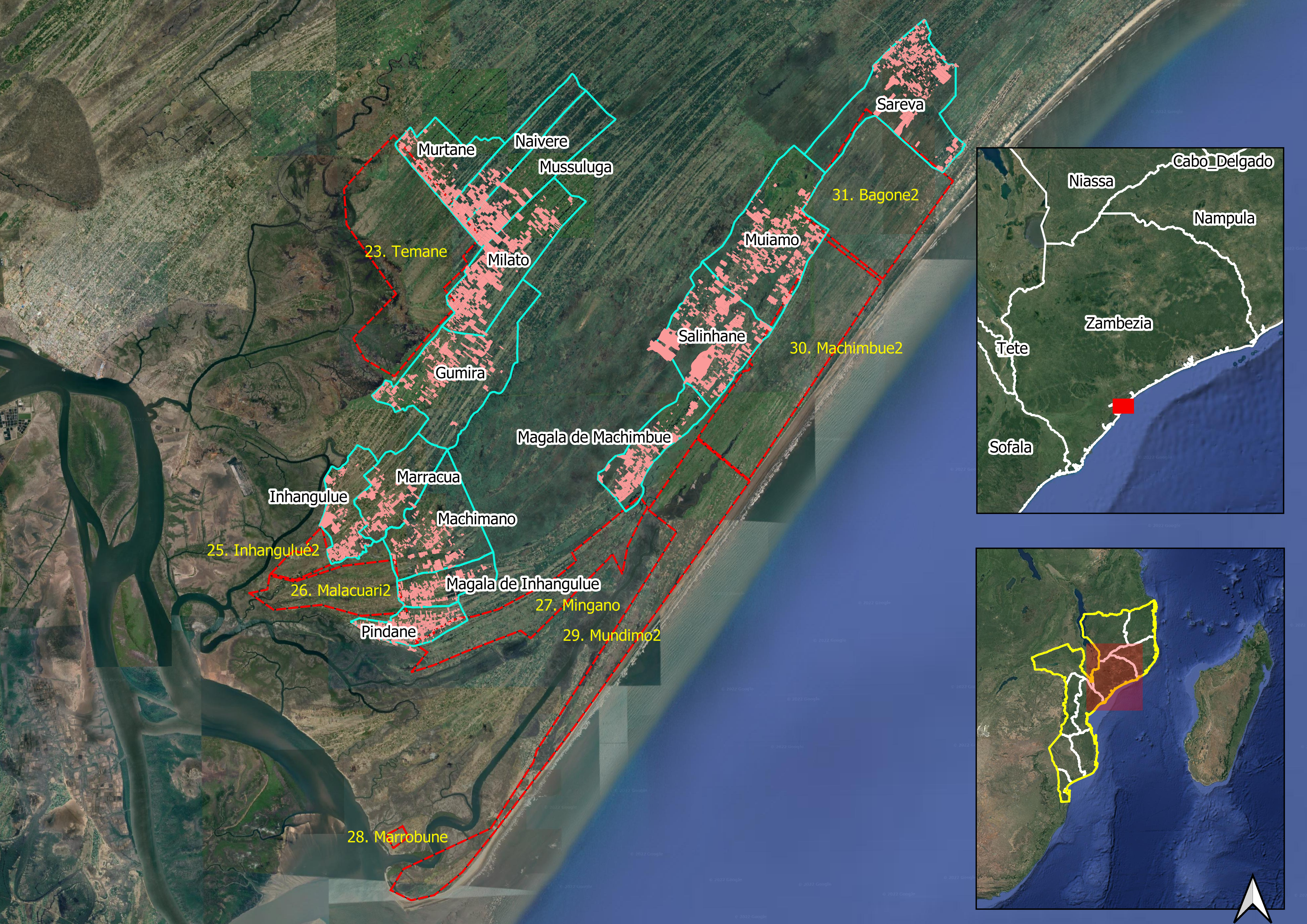
Madal landholdings (red dotted line), neighboring community boundaries (blue lines), and smallholder farmers (pink parcels) participating in the partnership. Photo credit: Terra Firma
Furthermore, rural communities often lack the technical knowledge and material resources to register their land rights. The process to document rights has been long and costly for most people. Gender inequality and gendered barriers make this process even more cumbersome for women. Women in Mozambique, like in most countries, have less access to information about land rights and financial resources to navigate land documentation processes. Discriminatory gender norms place men in charge of making decisions about the use of land and income derived from it. As a consequence, women’s plots are often of worse quality and smaller than men’s, and women may struggle to retain use of land in case of divorce or spouse death, especially if land is passed down through the male lineage.
In central Mozambique’s Zambézia Province, a growing population and a lack of available farmland has led roughly 50,000 people to move onto land owned by the agribusiness firm Grupo Madal, the majority of whom are women. This land has been managed as a private commercial agricultural estate for over 100 years, but it has become increasingly encroached upon over the last few years. Those encroaching on the land have not built any permanent structures on the land, signaling that they may know they could be removed any day. Nonetheless, these subsistence farmers are willing to risk eviction in order to grow food to support their families. The vast majority of people farming Madal’s land are women, and most farm tracts of land are smaller than a quarter hectare.
This scenario illustrates the far-reaching impacts of tenure insecurity on smallholder farmers and companies. Smallholder farmers are forced to make risky choices in order to support their families, working in informal situations with limited rights and protections and unable to make investments that could improve their present and future income. Companies face costly legal disputes that can hurt their bottom line and strain their relationship with local communities they rely on for labor. Greater clarity and protections around tenure security benefit both groups.
1 For an in-depth look at the implications of Mozambique’s Land Policy and Land Law, see USAID-Illovo case study.
The Innovation
Grupo Madal currently holds long-term leases from the Mozambican government for approximately 30,000 hectares of land across dozens of farms. The commodity exporter specializes in coconut products, guar beans, sun-dried tomatoes, sesame, and cattle production. In 2016, the company changed ownership, prompting a shift away from an estate-based production model, which had persisted since the country’s colonial period, to a more inclusive business model that is designed to intentionally integrate and benefit neighboring communities.
USAID is partnering with Grupo Madal to support communities that are farming on and adjacent to Madal land, raising awareness of land and resource rights while addressing harmful gender norms and promoting women’s empowerment. The USAID-Madal partnership has two central goals:
- Formalize land access and land use rights, with a focus on gender equality and social inclusion.
- Support sustainable, economically-viable use of the land that is mutually-beneficial for the company and smallholder farmers, particularly women.
The partnership is initially targeting 3,300 smallholder farmers, over 67 percent of whom are women, from 14 communities currently living on or adjacent to four Madal plantations in Zambézia Province.
Through an innovative model for ingrowers (mostly landless women currently farming on Madal land) and outgrowers (women and men farmers with land in neighboring communities), the partnership seeks to ensure these farmers can become productive members of Madal’s supply chains.
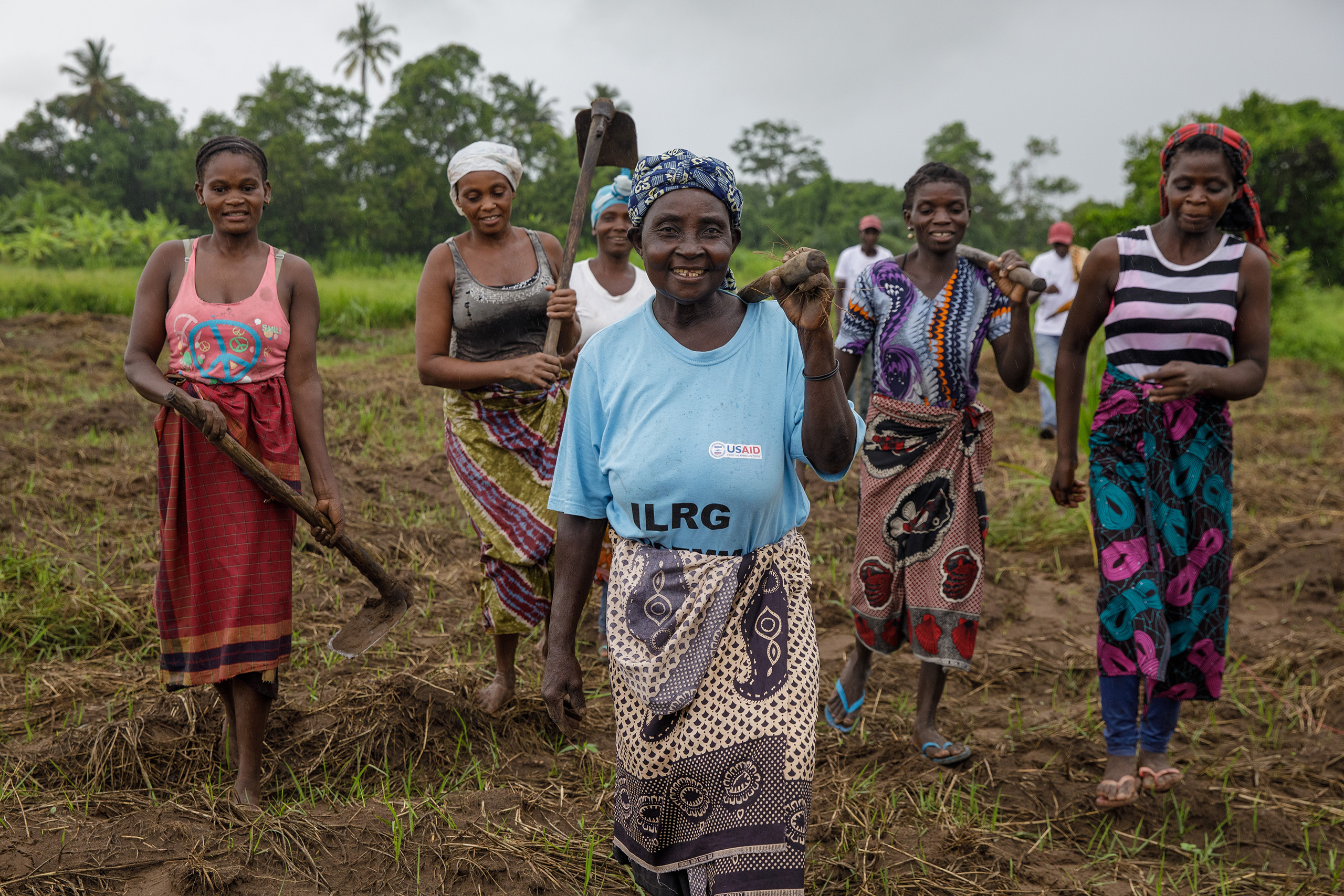
Floriana Mariano, center, and other women ingrower farmers were given land use agreements and farming contracts with Madal. They are now able to grow coconuts to sell to Madal, alongside their own subsistence crops. More than 85 percent of those participating in Grupo Madal’s ingrower and outgrower programs are women. Photo credit: Ricardo Franco.
Both women and men ingrowers are provided with secure rights to the encroached-upon land. Introducing land use agreements and farming contracts for the 1,300 ingrower families (85 percent women) solidifies land use rights for encroaching farmers and gives them opportunities to supply coconuts and other commodities to the company. With access to sufficient land to grow their own food crops for household consumption, Madal is promoting food security for families in the communities.
Neighboring communities are assisted to register their collective land rights, and potential outgrower candidates also receive support to register their individual farms. While Madal is ceding their rights to company land, it is providing members of local communities with long term land use rights and formal farming contracts.
For both the 1,300 ingrowers and the 2,000 outgrower families (55 percent women) from neighboring communities, the company provides agricultural inputs, gender-responsive extension services, and purchase guarantees for target crops.
The USAID-Madal partnership’s focus on resolving encroachment by providing long-term rights to encroachers, as well as strengthening nearby communities’ land rights using gender-responsive approaches, is the first of its kind in Mozambique. It has the potential to expand to additional Madal land in the country and create a viable model for responsible land-based investment that benefits both private sector actors and communities, while also contributing to women’s economic empowerment.
Given the high share of women farmers on and near Madal lands, gender equality is a major focus of the partnership. USAID is working with Madal to develop gender-responsive policies and procedures, engaging local communities in gender norms change dialogues, providing women with empowerment and leadership training, and engaging local women as community facilitators to expand Madal’s reach to women farmers. The Mozambique Ministry of Agriculture and Rural Development has already expressed interest in supporting expansion of this innovative model to other companies and provinces.
“It is not only a business decision, it is a commitment. We are not here just to earn money. Our idea is to share the land with the people who are using the land and use that opportunity to help the people to help Madal. It’s not Madal who is helping the people, it is the people who are helping Madal.”
João Lameiras, Administrator, Madal
The Champions
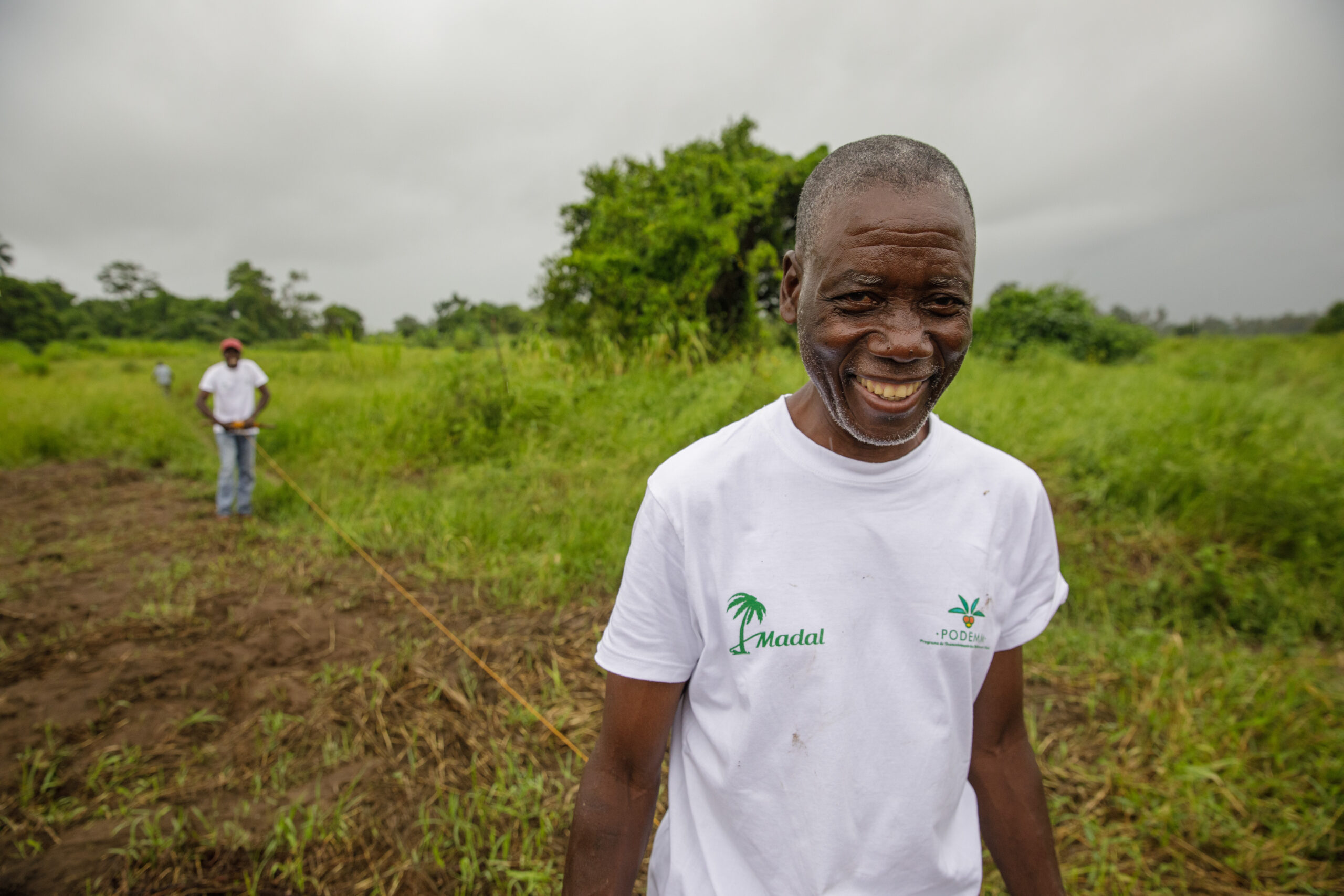
Assame Picale, Community Outreach Officer, Grupo Madal
Assame Picale is a community outreach officer for Grupo Madal, working directly with ingrower and outgrower communities under the USAID partnership. He and his team of facilitators provide training on sustainable agricultural practices needed for commercial production, providing extension support to farmers from land preparation to sale. Assame’s team advises farmers on the proper spacing between Madal provided coconut saplings so that farmers are able to plant other cash and subsistence crops under the coconut palms.
He notes that the majority of farmers he works with are women, because they are ones who cultivate the fields in this area, while most men work in town. Thus, “when it’s time for the farming contract to be signed,” he says, “they [women] are the ones in charge. The first women who joined the project demonstrated their benefit to the others and the participation has increased.”
Assame has worked for Madal for 43 years, and has witnessed many changes in company-community dynamics. He notes that this new project has been a learning experience for both the company and the communities. Since most farmers were growing crops for home consumption before, engaging with them to adopt new commercial farming practices takes time. “The work they were doing was in an unorganized way,” Assame notes. “There were technical norms that they didn’t use before.” But, he said that the company has seen production improve among the ingrower and outgrower farmers from last season, and that farmers now have additional income to support their families. “They are able to take their children to school. When there is no work for the men, the women are able to contribute to bring in income.”
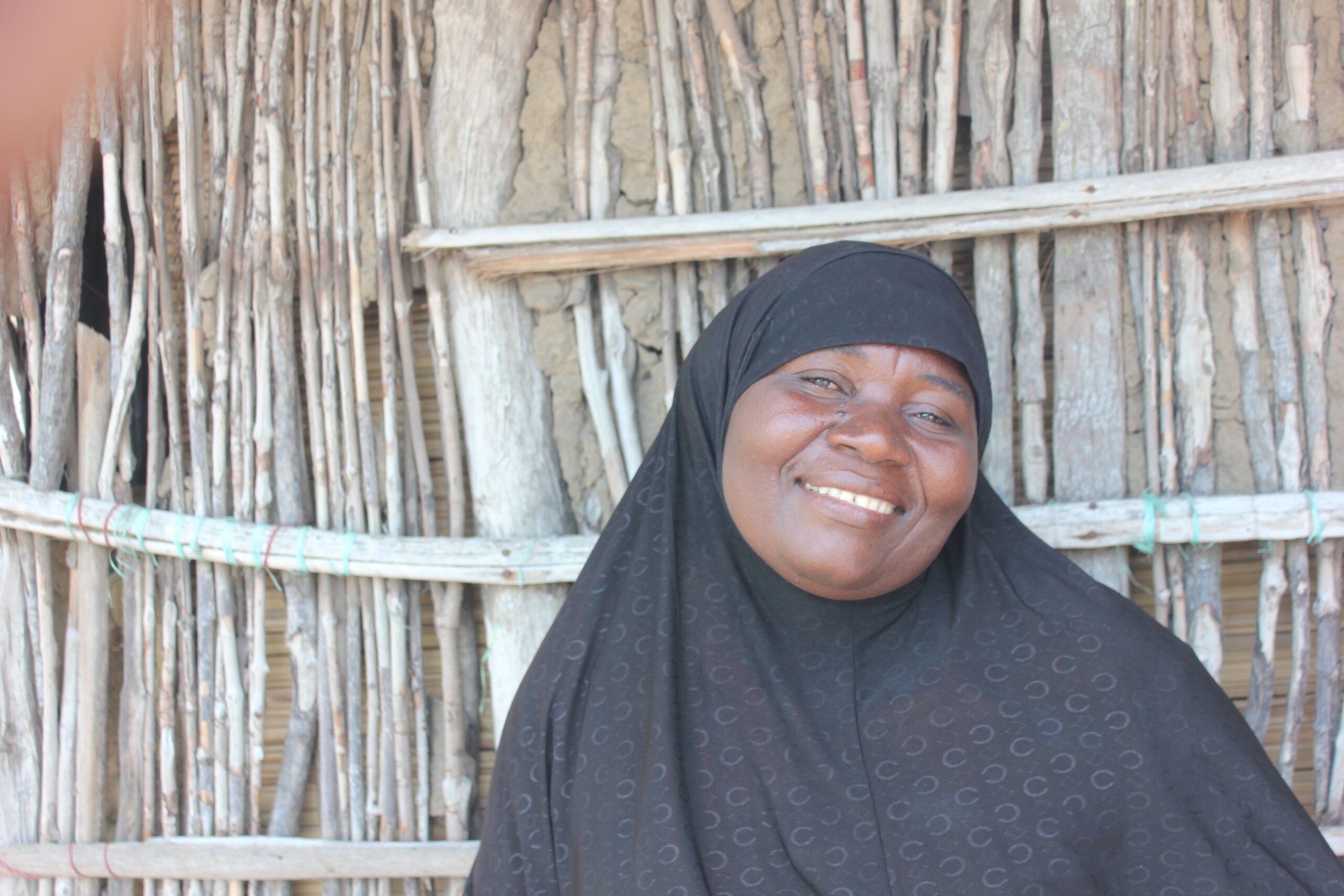
Ms Joana Albrinho Ajudante, a farmer and community extension agent for Madal in Zambezia. Photo Credit: NANA.
In 2017, Joana Albrinho Ajudante and her neighbors started growing rice, sweet potatoes, and cassava on land that is owned by Grupo Madal. Her small plot (0.06 hectares, or 1/7 of an acre), which was not being used by the company, produced enough food to feed her family, but due to its small size, insecure tenure, and lack of inputs, she could not also produce cash crops and earn income to help support her husband and three children.
Rather than evicting the farmers who had encroached upon its lands in Zambézia, Grupo Madal partnered with them. Under the USAID-Madal partnership, Joana has secured the use of a larger half-hectare plot of land (1.25 acres), and she is eager to increase production, earn more income, support her family, and invest in other productive endeavors.
“With the money I will get from sales, I will be able to buy cowpeas from other producers and sell them to Madal as a way to create another business,” says Joana Albrinho Ajudante.
Joana now serves as a community facilitator, helping other women farmers improve agricultural productivity. Madal recruited seven community members, four of them women, with farming experience and communication skills to reinforce the work of the company’s extension officers and increase engagement within the communities.
Most Madal extension agents are men, so engaging women like Joana as community facilitators has improved the company’s ability to reach women farmers. This community-based extension model promotes women’s empowerment, as it inspires other women by increasing not only technical skills but also women’s self-esteem and confidence.
Beyond additional income, Joana has been able to attend training on sustainable farming practices, gender equality, and women’s economic empowerment. Joana realized that she can manage her own earnings, rather than handing them over to her husband as is common in her community. Joana has begun applying these concepts in her work as a community facilitator, as well as her personal life. She sat down with her husband to discuss her interest in working more often outside the home, increasing crop production, and earning more money for the family.
“He realized that I even manage money and make better decisions about the use of money [than him]. Today I know I own my own money.”
Joana Albrinho Ajudante, farmer and community extension facilitator
The Impacts
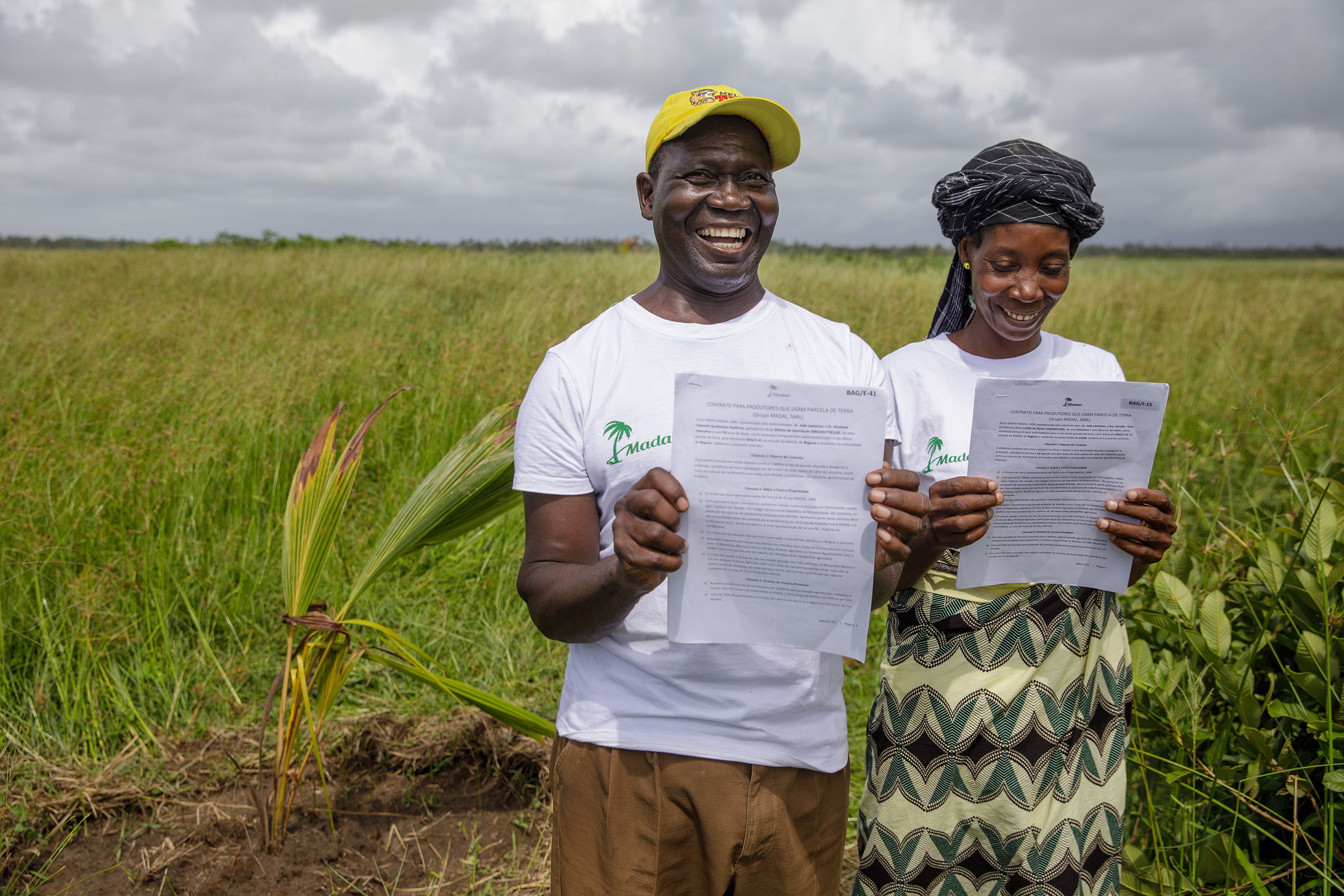
Asselavo Pauverno and his wife Nordita Raso receive their contracts to farm with Madal through the innovative in-grower partnership with the company. Photo credit: Ricardo Franco.
Since 2020, the USAID-Madal partnership has achieved the following results:
The USAID-Madal partnership shows that securing land rights can benefit private sector partners and the communities they work with and who live nearby.
From Madal’s perspective, this partnership has provided a way to engage with local communities while respecting and reinforcing community land rights. The approach has helped to reduce disputes between the company and local farmers over land tenure issues, expand their supply base, improve yields through the provision of additional extensions services, and better integrate women into their supply chain.
For local communities, the partnership has provided them with greater tenure security, solidifying long-term land use and farming contracts on land they were previously encroaching upon and feared losing at any time. It has also provided an incentive to invest in the land, as Madal now provides inputs, technical support, and guaranteed purchase agreements for farmers to scale up their production. The engagement has also preserved farmers’ ability to grow subsistence crops for household consumption, improving food security for families in and around Madal lands.
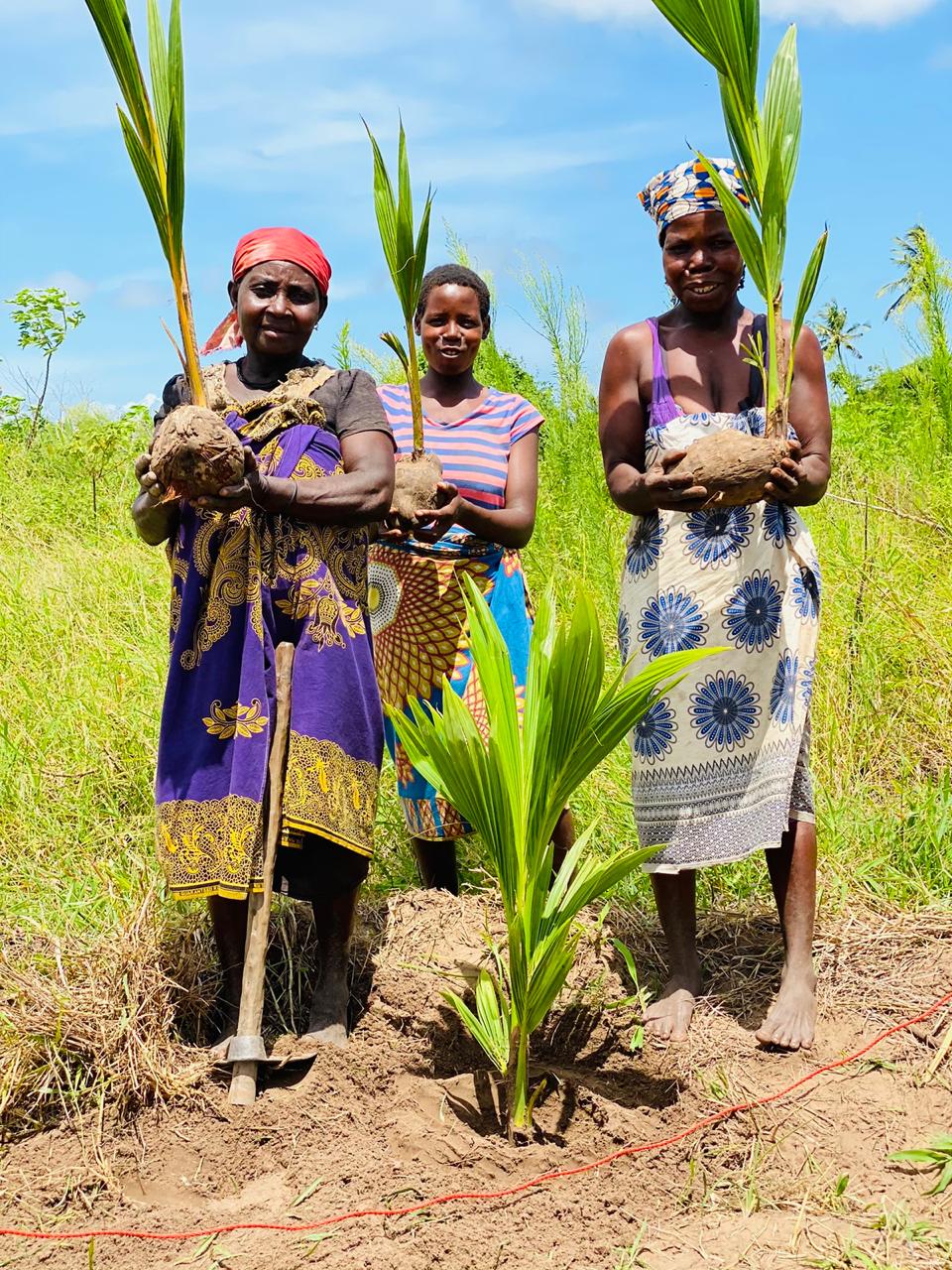
Ms. Floriana Mário José, Amélia Anifo and Laurinda all from Inhangule village, show some of the coconut saplings they received from Madal to plant in their newly confirmed ‘ingrower’ plots. Photo credit: Terra Firma.
The approach has intentionally focused on promoting women’s economic empowerment. Women are now able to earn their own income as contract farmers for Madal, providing additional economic security for their families. Women are likewise now serving as role models in their communities as community facilitators, inspiring other women to secure their land rights and invest in their plots, while shifting harmful gender norms that prevent women from being recognized as independent farmers. The integration of gender equality and women’s economic empowerment content into Madal’s extension service has also had wide-reaching impacts in the community. Women farmers are better aware of their rights and more confident to exercise greater decision-making power over land use and household expenditures that benefit their families and communities now and in the future.
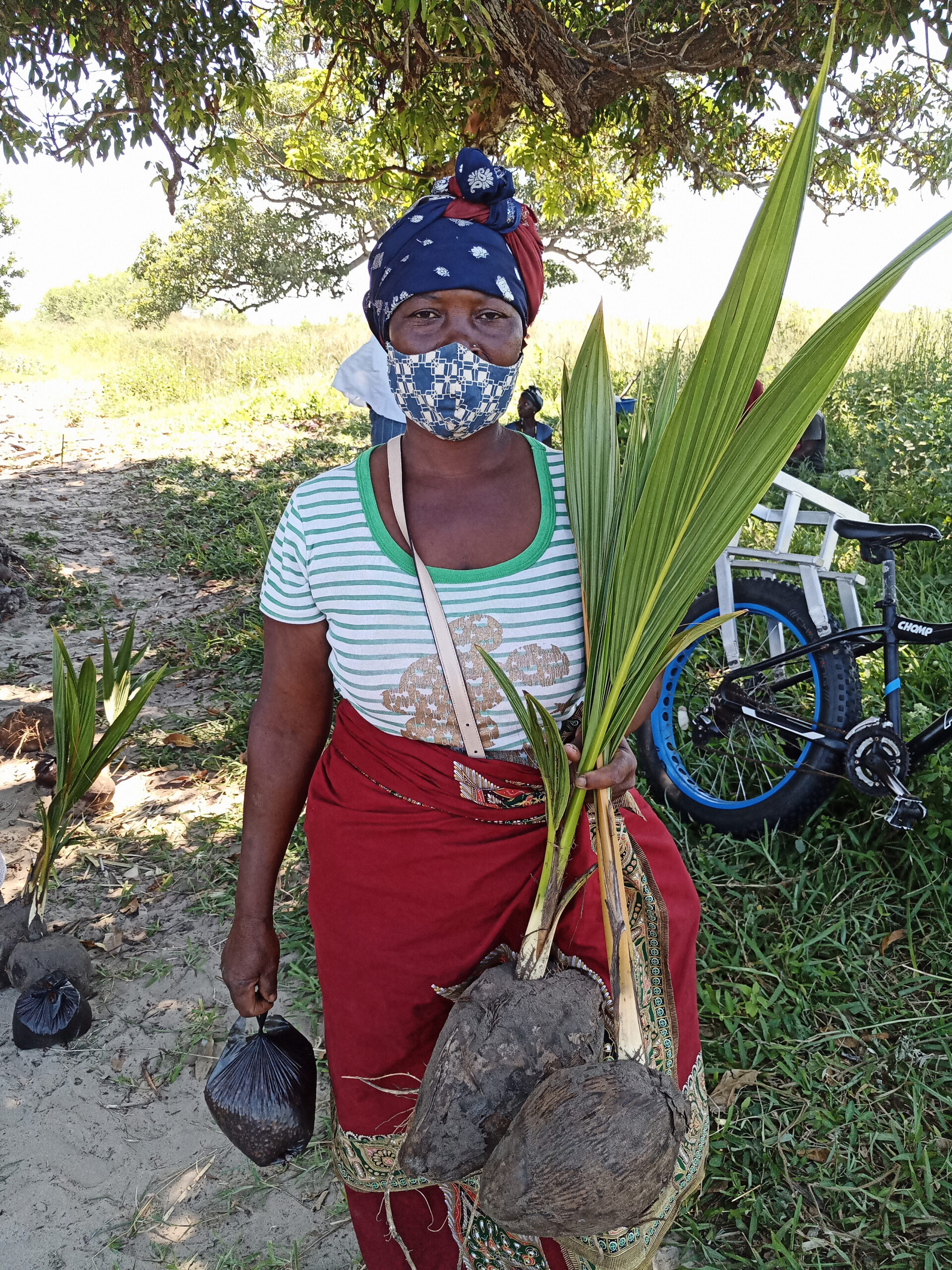
Sifa (above) was offered a contract to use a ½ hectare plot on Madal’s Bagone farm. She also received 2 kg of cowpea seed and her first two coconut saplings; she will get a total of 35 saplings. Photo Credit: Terra Firma.
Sifa Atumane Assane was overjoyed. After years of growing food on land belonging to Grupo Madal, the company granted her a land use contract and offered her the opportunity to be part of an ingrower network of coconut suppliers. This project is offering Sifa, and thousands of other women farmers, greater land security and economic opportunities. This security, together with the additional agriculture support offered through Grupo Madal, means that these women can grow food for their families while also producing and selling other crops.
Mrs Sifa Atumane Assane of Zalala community
The Implications
The USAID-Madal partnership can serve as a model for other private sector partnerships in the country and region, showing how investments in land tenure security can benefit both the company bottom line and local communities.
For USAID:
This partnership demonstrates USAID’s commitment to working outside the traditional development paradigm to bring in private sector partners in support of common goals. This private sector engagement serves to increase economic growth, promote women’s economic empowerment, and enhance community resilience. It illustrates both the necessity of secure land rights for greater economic investment, and the potential to complement government-led formal land registration processes through community-led, participatory methods of land documentation.
“USAID recognizes the scaling power of private sector partnerships and the role of secure land rights for women in creating peaceful and productive economies. Partnerships like this demonstrate that securing land tenure and promoting rural development can foster resilience and increase opportunities for social and economic empowerment for communities in Mozambique.”
Mary Hobbs, USAID
For Private Sector Partners:
This partnership has helped Madal solidify its operational shift to focus on rehabilitation of its historic underutilized landholdings and integration of communities into the supply chain for mutual benefit. By supporting local communities instead of evicting or ignoring them, Grupo Madal expects to see a reliable expansion of its farming supply base and an increase in quality production as community members have access to farmland, inputs and technical support. As the majority of smallholders cultivating Madal land and nearby land are women, the company has welcomed USAID support to strengthen its capacity to engage with farmers in a gender-responsive way. Grupo Madal sees this activity as a major opportunity to establish clarity on land rights and strengthen trust with the community by benefiting marginalized groups.
“Grupo Madal management is on board to ensure that parcels of ingrowers are formally recognized. We are offering long-term contracts for the use of land at no charge. Madal is also helping them arrange the parcels in a more efficient way that enables agroforestry, with intercropping of food and cash crops between alleys of coconut.”
João Lameiras, the company’s administrator
For Government Partners:
Partnerships between companies and local communities can help clarify long-standing tenure insecurities and recognize the rights of local communities. These partnerships can complement government-led formal land registration processes, providing a community-driven, inclusive, and low-cost alternative to strengthen tenure security. Private sector partnerships increase employment and economic growth in communities, empowering women and other marginalized groups by expanding their access to diversified livelihoods that can lead to improved decision-making power, responsible household spending, and food security.
For Communities:
Building partnerships with private sector companies can help communities secure their long-term rights to access and use land. By working directly with the companies, farmers can gain additional clarity around informal tenure arrangements, giving them the security to make investments in their plots. Smallholder farmers can also gain access to inputs and technical skills, expanding economic opportunity and wellbeing. These schemes can be particularly impactful for women, allowing them to maintain subsistence farming to feed their families while opening avenues for additional income earning potential.

